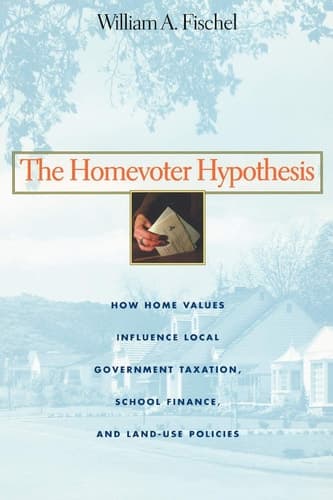
The Homevoter Hypothesis: How Home Values Influence Local Government Taxation, School Finance, and Land-Use Policies
by William A. Fischel
Published 2005 by Harvard University Press
344 pages
About this book:
Just as investors want the companies they hold equity in to do well, homeowners have a financial interest in the success of their communities. If neighborhood schools are good, if property taxes and crime rates are low, then the value of the homeowner’s principal asset―his home―will rise. Thus, as William Fischel shows, homeowners become watchful citizens of local government, not merely to improve their quality of life, but also to counteract the risk to their largest asset, a risk that cannot be diversified. Meanwhile, their vigilance promotes a municipal governance that provides services more efficiently than do the state or national government.
Fischel has coined the portmanteau word “homevoter” to crystallize the connection between homeownership and political involvement. The link neatly explains several vexing puzzles, such as why displacement of local taxation by state funds reduces school quality and why local governments are more likely to be efficient providers of environmental amenities. The Homevoter Hypothesis thereby makes a strong case for decentralization of the fiscal and regulatory functions of government.
Fischel has coined the portmanteau word “homevoter” to crystallize the connection between homeownership and political involvement. The link neatly explains several vexing puzzles, such as why displacement of local taxation by state funds reduces school quality and why local governments are more likely to be efficient providers of environmental amenities. The Homevoter Hypothesis thereby makes a strong case for decentralization of the fiscal and regulatory functions of government.
Recommended in:
- Why Housing Is So Expensive — Particularly in Blue States (Jul 19, 2022) with Jenny Schuetz
Recommended with:

Fixer-Upper How to Repair America's Broken Housing Systems
Jenny Schuetz

Crabgrass Frontier: The Suburbanization of the United States
Kenneth T. Jackson

Neighborhood Defenders
Katherine Levine Einstein, David M. Glick, Maxwell Palmer

Maid: Hard Work, Low Pay, and a Mother's Will to Survive
Stephanie Land

The Paradox of Democracy: Free Speech, Open Media, and Perilous Persuasion
Zac Gershberg, Sean Illing